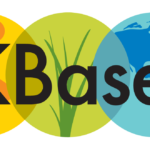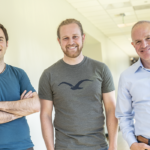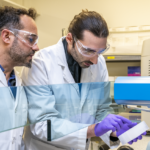In a letter to the editor published July 6 in Nature Biotechnology, the KBase team presented a comprehensive overview of the platform and an assessment of its scientific impact. The paper describes the unique features and infrastructure of the platform, in addition to highlighting scientific use cases that demonstrate its significance for biology research.
Mortimer Participates at AAAS Forum on Science & Technology Policy
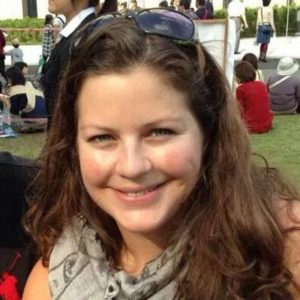 Jenny Mortimer, Deputy Vice President of the Feedstocks Division at the Joint BioEnergy Institute (JBEI) and Scientist with the Environmental Genomics and Systems Biology (EGSB) Division, participated at a 2018 AAAS Forum on Science & Technology Policy panel entitled “Science Competitiveness in Relation to Public Support for Science”. Panelists discussed how the scientific community must work to maintain societal relevance and build trust. Mortimer presented a code of ethics for scientists recently developed by the World Economic Forum’s Young Scientists community. The code serves as a tool to nurture a positive change of culture in the research world by not only guiding and shaping the behavior of individuals but also the processes of the scientific institutions that are to facilitate this cultural shift.
Jenny Mortimer, Deputy Vice President of the Feedstocks Division at the Joint BioEnergy Institute (JBEI) and Scientist with the Environmental Genomics and Systems Biology (EGSB) Division, participated at a 2018 AAAS Forum on Science & Technology Policy panel entitled “Science Competitiveness in Relation to Public Support for Science”. Panelists discussed how the scientific community must work to maintain societal relevance and build trust. Mortimer presented a code of ethics for scientists recently developed by the World Economic Forum’s Young Scientists community. The code serves as a tool to nurture a positive change of culture in the research world by not only guiding and shaping the behavior of individuals but also the processes of the scientific institutions that are to facilitate this cultural shift.
Faster, Cheaper, Better: A New Way to Synthesize DNA
Breakthrough discovery at the Joint BioEnergy Institute could greatly accelerate the pace of science
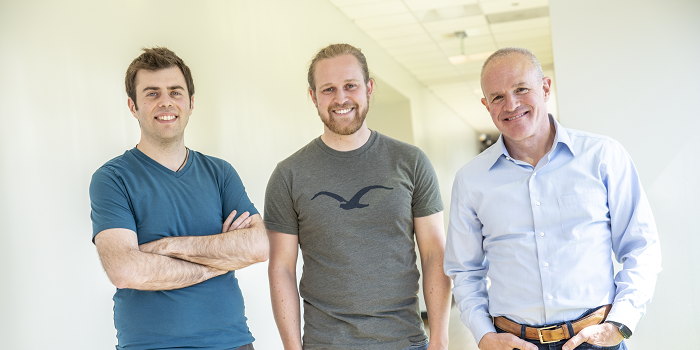 In the rapidly growing field of synthetic biology, in which organisms can be engineered to do things like decompose plastic and manufacture biofuels and medicines, production of custom DNA sequences is a fundamental tool for scientific discovery. Yet the process of DNA synthesis, which has remained virtually unchanged for more than 40 years, can be slow and unreliable.
In the rapidly growing field of synthetic biology, in which organisms can be engineered to do things like decompose plastic and manufacture biofuels and medicines, production of custom DNA sequences is a fundamental tool for scientific discovery. Yet the process of DNA synthesis, which has remained virtually unchanged for more than 40 years, can be slow and unreliable.
Now in what could address a critical bottleneck in biology research, researchers at the Joint BioEnergy Institute (JBEI), announced they have pioneered a new way to synthesize DNA sequences through a creative use of enzymes that promises to be faster, cheaper, and more accurate. The discovery, led by JBEI graduate students Sebastian Palluk and Daniel Arlow, was published in Nature Biotechnology in a paper titled “De novo DNA Synthesis Using Polymerase-Nucleotide Conjugates.” Read the Berkeley Lab News Center feature story.
New Machine Learning Approach Could Accelerate Bioengineering
Héctor García Martin and Zak Costello, scientists affiliated with the DOE Agile BioFoundry, the Joint BioEnergy Institute (JBEI), and the Biological Systems and Engineering Division have developed a way to use machine learning to dramatically accelerate the design of microbes that produce biofuel.
Their computer algorithm starts with abundant data about the proteins and metabolites in a biofuel-producing microbial pathway, but no information about how the pathway actually works. It then uses data from previous experiments to learn how the pathway will behave. The scientists used the technique to automatically predict the amount of biofuel produced by pathways that have been added to E. coli bacterial cells. The research is published online in Nature Partner Journal Systems Biology and Applications. Read the Berkeley Lab News Center feature story.
Keasling and JBEI Profiled in MIT Technology Review
Biosciences CSTO Jay Keasling and the Joint BioEnergy Institute (JBEI), which he oversees as CEO and Director of New Pathways and Metabolic Models, were profiled for the MIT Technology Review website. In the feature entitled “The Scientist Still Fighting for the Clean Fuel the World Forgot,” Keasling discusses the progress made in the quest for affordable advanced biofuels, and underscores the need for continued research.
- « Previous Page
- 1
- …
- 19
- 20
- 21
- 22
- 23
- …
- 37
- Next Page »
Was this page useful?


